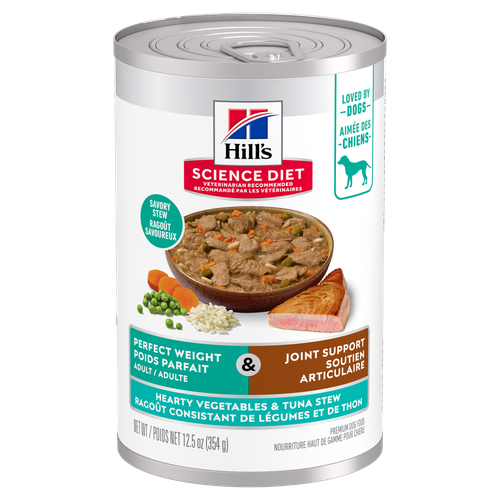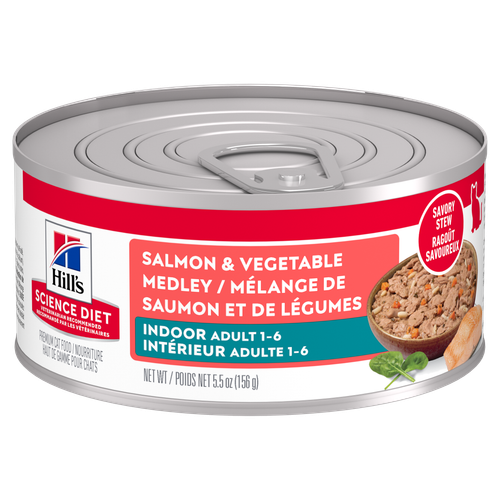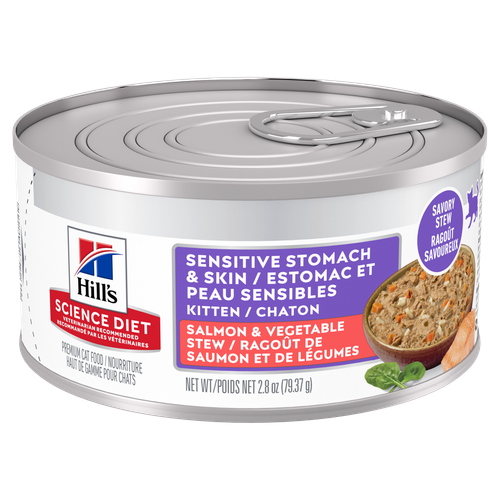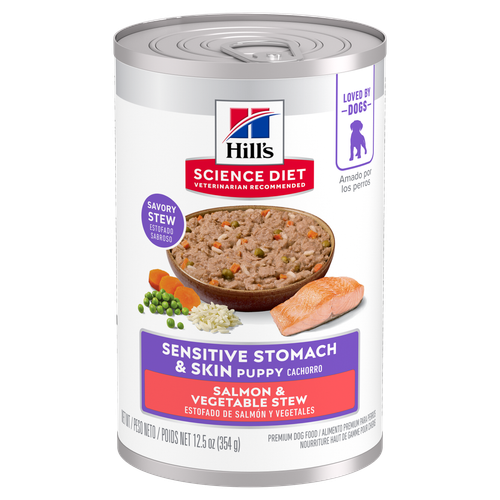
-
Find the right food for your petTake this quiz to see which food may be the best for your furry friend.Find the right food for your petTake this quiz to see which food may be the best for your furry friend.Featured products
 Adult Perfect Weight & Joint Support Hearty Vegetables and Tuna Stew Dog FoodShop Now
Adult Perfect Weight & Joint Support Hearty Vegetables and Tuna Stew Dog FoodShop Now Healthy Cuisine, Adulte, assortiment de conserves
Healthy Cuisine, Adulte, assortiment de conservesHill's Science Diet Healthy Cuisine Variety Pack
Shop Now Sensitive Stomach & Skin, assortiment de conserves
Sensitive Stomach & Skin, assortiment de conservesHill's Science Diet Sensitive Stomach & Skin Variety Pack
Shop NowFeatured products Adult Urinary Hairball Control Savory Chicken Entrée cat food
Adult Urinary Hairball Control Savory Chicken Entrée cat foodSupports the health of the whole urinary system with optimal levels of magnesium
Shop Now Adult Indoor Salmon & Vegetable Medley Cat Food
Adult Indoor Salmon & Vegetable Medley Cat FoodPrecisely balanced nutrition for indoor cats with the delicious taste of savory salmon and vegetables
Shop Now Kitten Sensitive Stomach & Skin Salmon & Vegetable Stew
Kitten Sensitive Stomach & Skin Salmon & Vegetable StewSupports kitten growth, digestive health, nourishes skin and promotes a lustrous fur
Shop Now -
Dog
- Dog Tips & Articles
-
Health Category
- Weight
- Food & Environmental Sensitivities
- Urinary
- Digestive
- Joint
- Kidney
- Dental
- Cancer
-
Life Stage
- Puppy Nutrition
- Adult Nutrition
- Senior Nutrition
Cat- Cat Tips & Articles
-
Health Category
- Weight
- Skin & Food Sensitivities
- Urinary
- Digestive
- Kidney
- Dental
- Stress
- Cancer
-
Life Stage
- Kitten Nutrition
- Adult Nutrition
Featured articles The Incredible Science Behind Your Pet's Microbiome
The Incredible Science Behind Your Pet's MicrobiomeLearn what a pet's microbiome is, how it contributes to your pet's gut & overall health, and why nutrition is important in maintaining healthy microbiomes.
Read More Pet Food Storage Tips
Pet Food Storage TipsDiscover how and where to store your dry, as well as canned, dog and cat food. Learn how to find the "best before" dates on all Hill's pet food packaging.
Read More Compare Your Pet Food's Calories to Other Brands
Compare Your Pet Food's Calories to Other BrandsCompare Hill's Science Diet dog and cat food's calories against other pet food brands and AAFCO recommended maximum calorie count.
Read More -


Overweight dogs are a growing problem for even the most attentive pet parents, and with that comes an array of concerns. Just like with people, an overweight dog often faces a range of health problems and weight issues can exacerbate existing ailments. While preventing weight issues is recommended, it's never too late to start a weight loss program with an overweight pooch. Knowing how to help your dog lose weight is just as important as recognizing that it needs to be done.
How a Dog Becomes Overweight
Your life is busier than ever and your dog's physical activity often gets placed on the back burner, especially if you don't have an energetic dog. It's thought that the number-one cause of overweight dogs is chronic overfeeding, and lack of activity doesn't help matters. Some breeds are more prone to weight issues, too, such as golden retrievers, bulldogs, and cocker spaniels.
But while some may think a pudgy pooch is cute, extra weight brings undue stress on bones and joints and an increased risk of diabetes, heart disease, high blood pressure and cancer, as the National Canine Cancer Foundation mentions. Further, you might find your dog is less tolerant of heat or has difficulty breathing. These are only some of the common weight-related illnesses seen in pets today.
How Can You Tell
If you don't know if your dog is overweight or not, it's best to seek professional help. Ideally, your veterinarian can help you make that judgment. But between visits, you can look for some signs at home. No matter your dog's breed, you should be able to feel all of your dog's ribs without a thick layer of fat over them. Your dog's chest should also be wider than his abdomen, with a noticeable tuck-up from chest to stomach. An overweight dog will generally have no waist and no distinction between chest and stomach. You may also notice he pants when walking, walks a bit slower than before, or naps more than usual. Luckily, it's easy to learn how to help your dog lose weight.
What Can You Do
Thankfully, there's a variety of options available to help your overweight dog. It's important to remember that these are lifestyle changes you need to make, just like the adjustments you'd make to reach a healthier weight yourself.
Get Moving
All dogs, not just an overweight dog, need physical exercise for both their mental and physical health. And when dogs get larger over time, it can be hard for pet parents to notice, leading to what the Association for Pet Obesity Prevention calls the "fat pet gap." Exercise can help combat (and prevent) this. Keep to scheduled exercise regimens and do your best to find something he enjoys, and you'll not only see an improvement in your dog's weight, but his mind as well.
Schedule Portioned Feedings
This sounds like one tip, but it's actually two. If you have an overweight dog, chances are he's eating more than he really needs. First, you want to make sure your dog eats at scheduled times throughout the day. Letting your dog graze all day long means you don't know how much he's eating and it's probably too much.
This brings us to the second piece—portion control. Know exactly how much your dog eats now and slowly lessen that amount to find out how much keeps him satisfied and at a healthy weight. Remember, what looks small for you will likely fill your dog's stomach up substantially. If you're unsure about the proper portion size, check in with your vet to confirm. Also, consider how many treats your dog gets each day and subtract those from his daily meals.


Tasty Tips
Make Sure Everyone's On Board
Your entire household needs to be on the same page when it comes to your dog's weight. If you have an overweight dog and someone is sneaking extra treats or feeding even a little more than he needs into his daily meals, you're not going to see much progress in his weight loss. Making sure everyone is on board with the plan is as important as the effort you put toward the change.
Check in

Take your dog in for regular weigh-ins. Just like you would weigh yourself regularly when you're trying to lose weight, keeping track of your dog's progress is important to success. You'll learn how much food works for maintaining a healthy weight in your dog, as well as what might be too much or too little food. Plus, it will be motivating to see a smaller number on the scale. It's smart to go to your veterinarian's office (or purchase your own dog scale) for regular weight checks because using a human scale can be inaccurate. If your pooch is a smaller breed, you can also use a baby scale to get more accurate readings.
Stay Strong
It's difficult for pet parents to get an overweight dog on a weight loss program. Food is love to some dogs and all pet parents love treating their dogs and seeing him happy. Some pet parents feel bad for their dogs when they see them begging for food, so giving in is often what keeps dogs from losing weight successfully. Just remember—your dog doesn't think or feel that you love him any less should you feed him smaller meals or fewer treats. There's no need for you to feel guilty! Even if your dog does love food, you can substitute the fun you have sharing snacks with play and exercise.
If you're experiencing difficulty helping your dog reach a healthy weight, you should reach out to your vet's office. They will have food recommendations for overweight dogs, and your vet can help ensure your dog is getting adequate nutrition, even with smaller meals. Every dog will lose weight differently, and because there are many factors to address when raising a dog with a weight problem, working with a veterinary professional will keep you both on the right track. An overweight dog is not a healthy or happy dog, and the dangers of chronic weight issues are too great to ignore. While it might be hard work that lasts a lifetime, keeping your dog at a healthy weight will ensure a lifetime of health and joy for both of you.


Katie Finlay is a pet trainer who lives in Southern California. She has been working with dogs and their owners both in person and through her online content for over six years.
Related products

Hill's Science Diet Sensitive Stomach & Skin Variety Pack

Hill's Science Diet Healthy Cuisine Variety Pack

Gentle on stomachs while nourishing skin & supporting development in growing puppies

Related articles

Learn how to stop your dog from begging at the dinner table, and understand how it can help contribute to his health.

Proper nutrition for your pregnant or nursing dog is vital to her and her puppy's health. Learn what you should do provide her with the proper nutrients.

Discover fun and engaging games and other ways to help your dog exercise, keeping him happy and healthy.

Gather the following puppy supplies to prepare your family for all the fun (and commitment) that comes with being a dog parent.

Put your dog on a diet without them knowing
Our low calorie formula helps you control your dog's weight. It's packed with high-quality protein for building lean muscles, and made with purposeful ingredients for a flavorful, nutritious meal. Clinically proven antioxidants, Vitamin C+E, help promote a healthy immune system.
Put your dog on a diet without them knowing
Our low calorie formula helps you control your dog's weight. It's packed with high-quality protein for building lean muscles, and made with purposeful ingredients for a flavorful, nutritious meal. Clinically proven antioxidants, Vitamin C+E, help promote a healthy immune system.

